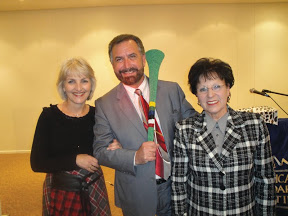 |
| Rabbi and Mrs Rosen with Li Boiskin and the vuvuzela he received from the Board. |
There have been great horrors and mass bloodshed perpetrated in the name of religion but most of today’s conflicts that are designated as religious are in fact territorial conflicts, Rabbi David Rosen told a gathering at the Cape Board’s ‘In touch with the community’ public forum in August.
Rabbi Rosen, who addressed the topic: ‘Is religion the problem or the solution?’, is an expert in interfaith dialogue and the international director of the American Jewish Committee’s Department of Interreligious Affairs.
“Why is it that religion is so easily abused?” he asked. “Our Talmudic sages described the Torah as being both the elixir of life and the elixir of death — it can be a potently positive and a dastardly destructive force.”
When a people felt insecure, it was the role of religious leaders to give succour, he said. “Religion then often denigrates and demonises the other and betrays its most noble attributes, leading to greater hostility between the parties.
“A religion that is true to its most noble values encourages us to contribute to our neighbours in the wider society, and to do that, we have to feel comfortable in the wider society, rather than see each other as adversaries,” Rabbi Rosen suggested.
Turning his attention to the Middle East, he said that the situation there was substantially of “denigrating he other” — where each party saw itself as the victim. In Israeli society, however, there was quite a range of intergroup activity promoting Arab-Jewish relations and those between Muslims, Christians and Jews. Yet these were mostly “fringe” and were often hostile to their respective religious establishments.
Stressing that the conflict in the region was territorial rather than religious, Rabbi Rosen noted that the land was important to both Jews and Muslims.
“It doesn’t matter what the history is or how many times it is mentioned in the texts, the attachments are here and can be used to affirm or denigrate the other.”
In recent times, however, the conflict had become “religionised”, leading to a dangerous situation. The Muslims were convinced of a“nefarious plot against Islam”, including the destruction of their shrines on the Temple Mount, whereas “for us, there is a deep sense that our profound attachment to Jerusalem is not
respected.
“If it is territorial, one can find a territorial compromise, but if it is portrayed as religious, we are being condemned to eternal bloodshed. And time is not on our side,” he warned.
“If you want to deal with the challenge of the abuse of religion, the only solution is to ensure that religion is part of the solution and not just part of the problem,” Rabbi Rosen maintained. He referred to an initiative — the first such in history — that had brought 15 leaders of three faiths in the Holy Land together in Alexandria at the height of the Second Intifada. The resulting declaration condemned violence in the name of religion as the desecration of religion and called for peace and reconciliation.
In the wake of the summit, the Council of the Religious Institutions of the Holy Land was formed, with one of its purposes to combat incitement and defamation. Any mention of one religion that is distorted, perverted and maligning adherents or their faith values will be condemned by all three.
“To that end, the Council is now embarking on a very important initiative: to look at all the textbooks used within both Israeli and Palestinian schools,” Rabbi Rosen said to applause from his audience, “so one will be able to identify what needs to change and how we can advance an image of theother that is constructive.”











